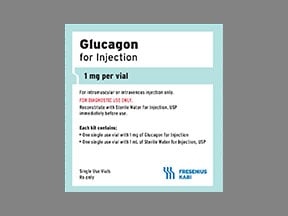
Glucagon Hcl (diagnostic) Coupons & Savings Card – Discount Prices from $136.71
Glucagon hydrochloride is a synthetic form of the hormone glucagon, which is naturally produced by the pancreas. In medical diagnostics, it is utilized to temporarily relax the smooth muscles of the gastrointestinal (GI) tract, facilitating clearer imaging during radiologic examinations. By inhibiting the movement of the stomach, intestines, and colon, glucagon hydrochloride enhances the quality of images obtained during procedures such as X-rays and CT scans. The typical dosage for relaxing the stomach and small bowel ranges from 0.2 mg to 0.5 mg administered intravenously, or 1 mg intramuscularly. For the colon, the recommended dose is 0.5 mg to 0.75 mg intravenously, or 1 mg to 2 mg intramuscularly. It's important to note that glucagon hydrochloride should not be used in individuals with certain conditions, such as pheochromocytoma or insulinoma, due to potential adverse effects. Common side effects may include nausea, vomiting, and injection site reactions. This medication should only be administered by healthcare professionals in a controlled medical setting.
Our coupons are free to use. Before paying, show the pharmacist your Glucagon Hcl (diagnostic) savings card to get your free discount. Use our filters below to edit the prescription box to match your needs. The Glucagon Hcl (diagnostic) prices will update based on your prescription needs. Above our Glucagon Hcl (diagnostic) coupons, you can change your location to see pharmacy prices and costs in other areas. We're here to help you buy Glucagon Hcl (diagnostic) at the lowest price with our prescription discount card.
My prescription
Edit
1MG, Glucagon Hcl (diagnostic) (1 Solution Reconstituted)
Select pharmacy

CVS
$283.70
COUPON PRICE
Walmart
$136.71
COUPON PRICE
Albertsons
$156.60
COUPON PRICE
Walgreens
$156.60
COUPON PRICEGlucagon Hcl (diagnostic) savings card
Show this card to your pharmacist
Walmart
$136.71
BIN
ID
PCN
GRP
019876
LHCF333844
CHIPPO
LHX
Powered by
Glucagon hydrochloride is a synthetic form of the hormone glucagon, which is naturally produced by the pancreas. In medical diagnostics, it is utilized to temporarily relax the smooth muscles of the gastrointestinal (GI) tract, facilitating clearer imaging during radiologic examinations. By inhibiting the movement of the stomach, intestines, and colon, glucagon hydrochloride enhances the quality of images obtained during procedures such as X-rays and CT scans. The typical dosage for relaxing the stomach and small bowel ranges from 0.2 mg to 0.5 mg administered intravenously, or 1 mg intramuscularly. For the colon, the recommended dose is 0.5 mg to 0.75 mg intravenously, or 1 mg to 2 mg intramuscularly. It's important to note that glucagon hydrochloride should not be used in individuals with certain conditions, such as pheochromocytoma or insulinoma, due to potential adverse effects. Common side effects may include nausea, vomiting, and injection site reactions. This medication should only be administered by healthcare professionals in a controlled medical setting.
Our coupons are free to use. Before paying, show the pharmacist your Glucagon Hcl (diagnostic) savings card to get your free discount. Use our filters below to edit the prescription box to match your needs. The Glucagon Hcl (diagnostic) prices will update based on your prescription needs. Above our Glucagon Hcl (diagnostic) coupons, you can change your location to see pharmacy prices and costs in other areas. We're here to help you buy Glucagon Hcl (diagnostic) at the lowest price with our prescription discount card.
Glucagon Hcl (diagnostic) dosage forms
Use our Glucagon Hcl (diagnostic) 1MG coupon with prices from $136.71 for 1 Solution Reconstituted. You can also use our Glucagon Hcl (diagnostic) 1MG coupon with prices from $1538.01 for 10 Solution Reconstituteds.
Dosage Quantity Price from Per unit 1MG 1 Solution Reconstituted $136.71 $136.71 1MG 10 Solution Reconstituteds $1538.01 $153.80
| Dosage | Quantity | Price from | Per unit |
|---|---|---|---|
| 1MG | 1 Solution Reconstituted | $136.71 | $136.71 |
| 1MG | 10 Solution Reconstituteds | $1538.01 | $153.80 |
